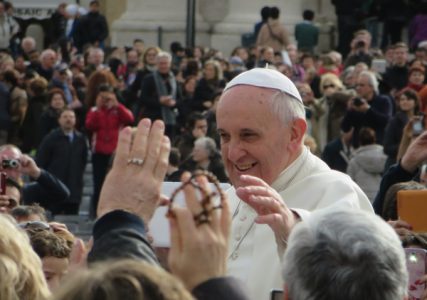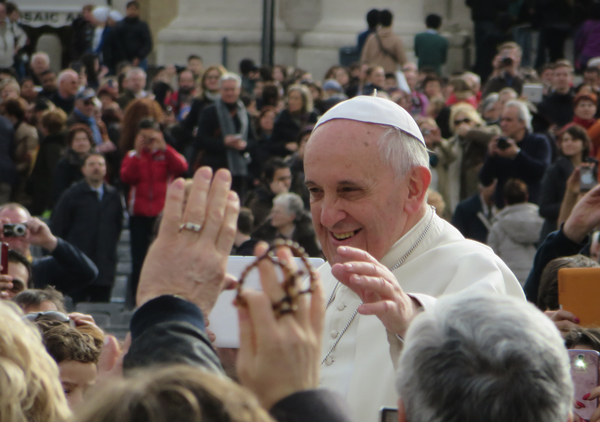
Pope Francis greets a crowd on his way to a meeting with cardinals at the Vatican on Feb. 21, 2014. RNS photo by David Gibson
(RNS) Reinterpreting Pope Francis after he utters one of his viral, off-the-cuff comments is a cottage industry, especially among those who love the pontiff and don’t want anything undermining their devotion (liberals, for the sake of argument) and among those who disagree with Francis but who have relied on popes as allies for so long they need to make Francis sound like he agrees with them (conservatives, let’s say).
I don’t want to fall into either camp, or set myself up as the all-knowing and unassailably sane centrist. But Francis’ remarks this week to reporters about the terror attacks in Paris and freedom of speech and whether he would be right to smack his mamma-insulting aide have been so misconstrued they could use a rewrite.
To recap: during an in-flight news conference with the papal press corps on the way from Sri Lanka to the Philippines, Francis was asked by a French journalist about the horrific terror attacks that targeted the satirical weekly Charlie Hebdo. The pope said that violence, especially in the name of God, was never justified, a point he has often made.
Then he seemed to modify that by noting: “You cannot provoke, you cannot insult the faith of others. You cannot make fun of the faith of others … There is a limit. Every religion has its dignity … in freedom of expression there are limits.”
He had also said, with a laugh and by way of example, that if Alberto Gasbarri (the longtime Vatican papal trip organizer who was standing beside him on the plane) cursed his mother, “then a punch awaits him. But it’s normal, it’s normal.”
WHAT??!!
The immediate reactions were decidedly negative, from all sides, because the pope – of all people – was saying that:
- You can’t criticize religion;
- Governments are right to limit the freedom of expression, even through notorious “blasphemy” laws;
- Sure, the attacks were bad, but the victims really had it coming;
- All that “turn the other cheek” stuff Jesus said is optional and violence can be acceptable.
Those points were made by numerous commentators, among them and most pointedly, by my RNS colleague Brian Pellot in this post. in which he argues that ” ‘Friendly Francis’ just threw free speech under the popemobile.”
Well, actually, I’d respond by saying: No. And no, no, and no to those other points.
First, Francis was talking about core issues, the two “fundamental human rights, religious liberty and liberty of expression” and how we balance those rights.
Yes, he said, religious freedom is foundational, but you can’t kill in the name of religion, of course. That’s a limit. He also stressed that everyone has the right and in fact the “obligation” to speak out and to say what they think. If you don’t say what you think then you don’t “collaborate for the common good.” That includes criticizing religions and religious institutions, which he himself did in that press conference with remarks about the violent history of his own Catholic Church in France. He has done that many times in reference to the church, and has encouraged others to do the same.
So he wasn’t saying you can’t criticize religion, not at all.
Was he saying that the state should limit free speech, even using blasphemy laws? Hardly.
The pope was speaking about human behavior, and how gratuitously provoking and offending somebody or their beliefs is going to anger them, and in fact does not respect their “dignity” and ought to be avoided. That’s basic Christianity, as well as basic good manners.
“He is saying from a moral point of view you should not do it,” as the Rev. Jonathan Morris rightly put it on Sean Hannity’s Fox News show (in response to Kirsten Powers’ claim that “the pope said we shouldn’t criticize them (Muslims) and “criticism is taken as an insult”).
https://www.youtube.com/watch?v=9x_AuY7CcoM
Again, the pope was talking about building up the common good and each other – about interpersonal relations, not so much about legal remedies.
Also, Francis was not saying that the victims deserved their fate or that a reaction that might be understandable in human terms – a punch in the nose over insulting my mother – is at all justifiable in legal or moral terms.
“Obviously he wasn’t justifying violence,” the Vatican spokesman, the Rev. Federico Lombardi, told the AP’s Nichole Winfield, who did a fine exploration of this aspect of the pope’s comments. “He spoke about a spontaneous reaction that you can have when you feel profoundly offended. In this sense, your right to be respected has been put in question.”
She also quoted the Rev. Robert Gahl, a moral theologian at Rome’s Pontifical Holy Cross University, who “noted that Francis didn’t say that HE would have punched his friend for insulting his mother. He said his friend could expect to be punched, given that he should know that he had crossed a moral line in lobbing the insult and should be more careful and courteous in not causing offense.”
“The pope is not going to hit somebody back,” Gahl told Winfield. “It’s presupposed that a pope, who is supposed to impersonate Jesus, ought not to use violence.”
Many seem to have forgotten that presupposition.
That’s odd, because in his initial comments the pontiff says freedom of expression is a basic right and that violence is not justified, and not in this case. Was he suddenly contradicting himself? I don’t think so.
So why were the pope’s words misconstrued? I’d say four factors are at work:
ONE: Francis can get lost in translation.
As church historian (and native Italian) Massimo Faggioli has noted, Francis’ words can be difficult to translate easily, especially into English (Francis is a native Spanish speaker with excellent Italian). And especially when he is speaking extemporaneously, as he often does, and colloquially, as he often does.
The in-air press conference was a case in point: some translated the pope as saying:
“You cannot provoke, you cannot insult the faith of others. You cannot make fun of the faith of others.”
That was the phrasing our initial report used and perhaps one reason some, like Brian, denounced the words as “prescriptive thou shalt nots.”
Others tracked the pope Italian more closely, rendering the impersonal pronoun and making it a bit less prescriptive-sounding:
“One cannot provoke, one cannot insult other people’s faith, one cannot make fun of faith.”
His phrasing in Italian was “Non si può provocare, non si può insultare la fede degli altri, non si può prendere in giro la fede.” One could also translate that as saying, “Hey, you just don’t going around provoking, insulting other people’s religion! It’s not done!” In other words, that’s not how we were raised to treat others, so don’t be a jerk.
Here is the original Italian transcript, but I’d also recommend this translation by the Ad Majorem Dei Gloriam blogger, who notes:
Translating the conjugation used “non si puo” is nearly impossible, because in Romance languages, the passive voice is preferred, but the inference is a “one shouldn’t” not “it should be prohibited.
(Also see America magazine’s unofficial English translation.)
TWO: Francis speaks differently from most popes
“The Pope’s words about Dr. Gasbarri were spoken colloquially and in a friendly, intimate matter among colleagues and friends on the journey,” the Rev. Thomas Rosica, a Canadian priest who assists the Vatican press office, said in an email. “The Pope’s free style of speech, especially in situations like the press conference must be taken a face value and not distorted or manipulated.”
The problem is that the world, and the media, are used to popes speaking in categorical ways, as if every utterance is a new codicil to the catechism and potentially magisterial. This “creeping infallibilism” of the papacy has been widely lamented and it’s something Francis is trying to change.
The rest of us may need to catch up. He talks about faith as applied in everyday life, in interpersonal terms. The eternal principles underlie what he is saying. But he deals with the real world. As he just said again in the Philippines, “Reality is superior to ideas!” If Francis is a casuist (insert Jesuit joke here), he’s not making case-based law. He’s speaking relationally, not ideologically.
There was another echo of that approach in the pope’s ad-libbed remarks Friday at a meeting with families in the Philippines when he praised the church’s teaching against contraception — but highlighted that people must be treated as individuals and with mercy and understanding.
The rule is the rule, he seemed to say, but don’t use it to hurt people. Be merciful and flexible. Similarly, freedom of expression and religion are beyond question, but don’t abuse them. It’s not what Jesus would do.
THREE: The Catholic Church tends to speak in absolutes
That’s an older tradition than papal infallibility, and it’s also a problem for the church when it comes to communications. Every statement can seem official, if not officious, and definitely not pastoral, and must of course be citing some longstanding law or tradition.
Listening to many church leaders can be like listening to a legal brief, and just as exciting. Francis is less that way than Benedict XVI or even John Paul II (who also had their share of “gaffes” in impromptu comments). He doesn’t want the church to speak in rules but in human terms. That’s turning around the proverbial aircraft carrier. When the church has always spoken in proscriptions and prescriptions, that’s how audiences will interpret the church’s statements.
FOUR: The world also speaks in absolutes
The culture has become as dogmatic – in the worst sense, as simplistic – as any religious tradition, and when the pope speaks he too has to be slotted into some category.
This is a consequence of how so much of our discourse has been reduced to ideological positions and “snackable” portions that don’t allow for much nuance or extended thought or reference to actual human beings.
Listening to the pope with “the ear of the heart,” as St. Benedict had it, might actually give a more accurate rendering of what he is saying, even if that’s tough to reduce to a 140-character tweet.
Hence, this long blog post.
PS: For the shorter version, check out my colleague Mark Silk here.
DAVID GIBSON





